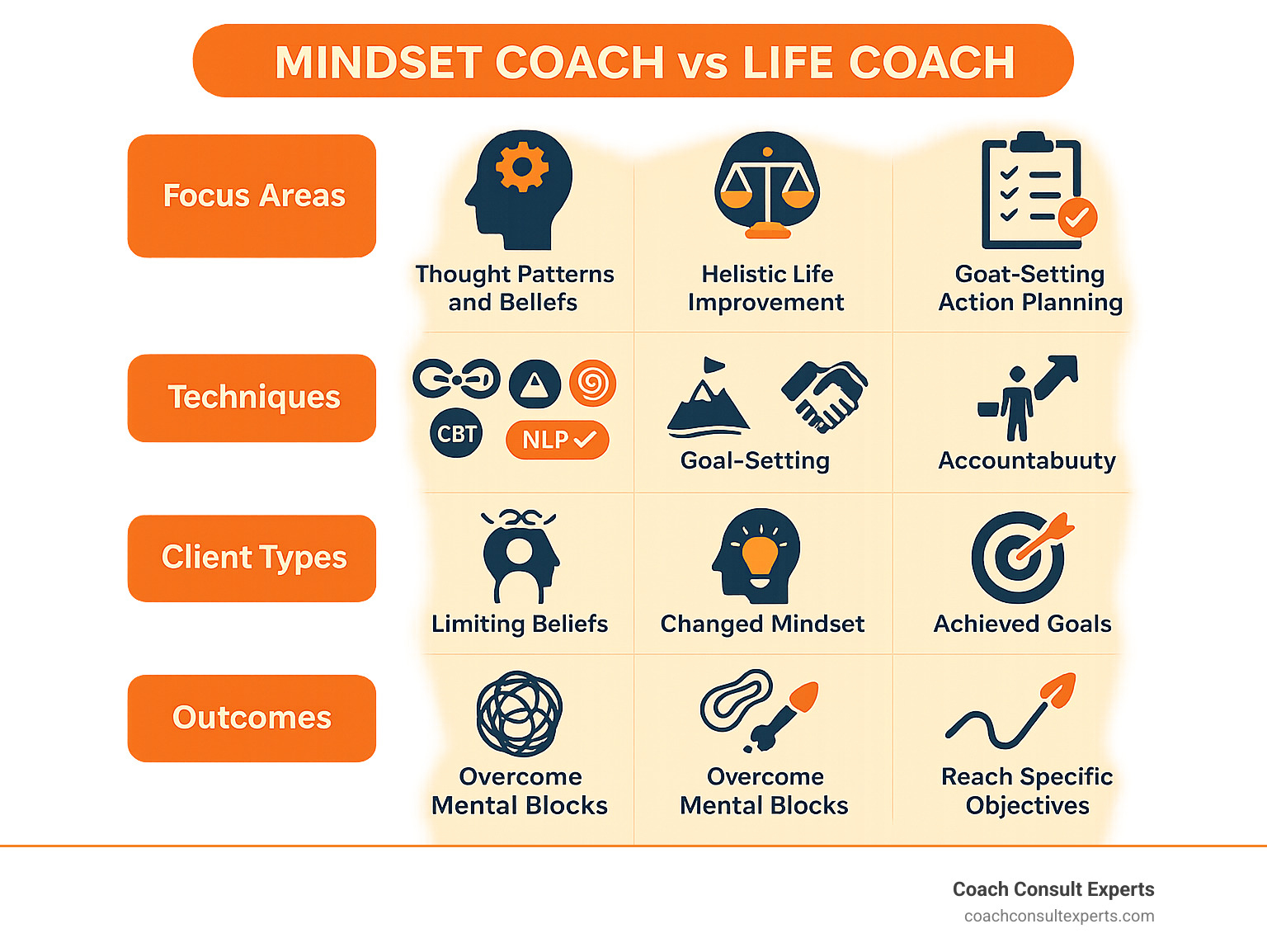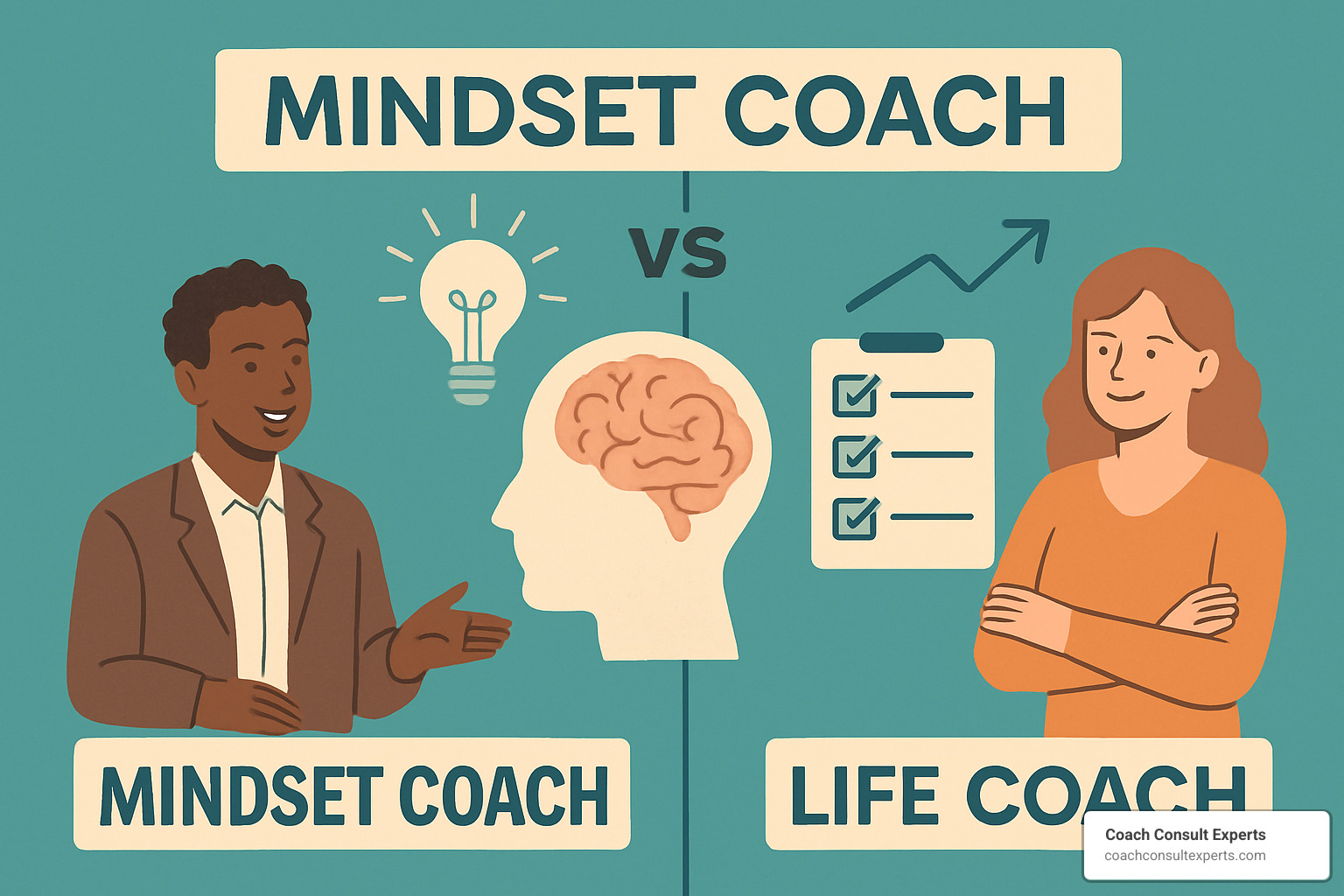Mindset coach vs life coach: 5 Powerful Differences in 2025
Understanding the Key Differences: Mindset Coach vs Life Coach
If you’re exploring coaching options, here’s a quick comparison of mindset coach vs life coach:
| Aspect | Mindset Coach | Life Coach |
|---|---|---|
| Primary Focus | Changing thought patterns and beliefs | Holistic life improvement and goal achievement |
| Techniques | CBT, NLP, visualization, hypnosis | Goal-setting, action planning, accountability |
| Best For | Overcoming limiting beliefs, building confidence | Life transitions, practical goal achievement |
| Approach | Works with subconscious patterns | Works with conscious behaviors and actions |
| Typical Results | Internal change, shifted perspective | External achievements, improved life structure |
When considering the difference between a mindset coach vs life coach, it’s important to understand that both aim to help you reach your full potential, but they take different paths to get you there. Mindset coaches focus specifically on rewiring your thought patterns and belief systems, while life coaches take a broader approach to help you set and achieve goals across various life domains.
A mindset coach specializes in changing your inner landscape—addressing limiting beliefs, negative thought patterns, and subconscious blocks that may be holding you back. They often employ techniques from cognitive behavioral therapy, neurolinguistic programming, and positive psychology to help you develop mental resilience and a success-oriented mindset.
Life coaches, on the other hand, typically work more holistically across different areas of your life—career, relationships, health, and personal development. They help you clarify goals, create actionable plans, and provide accountability as you work toward specific outcomes.
I’m Coach Mary Chege-Kamau, a PCC Professional Certified Coach with the International Coaching Federation who has helped thousands steer the complex decision between a mindset coach vs life coach, drawing on my experience in changeal coaching and mental wellbeing to guide professionals toward the coaching approach that will best serve their unique needs.

What Exactly Is a Mindset Coach?
Ever felt like your own thoughts were holding you back? That’s where a mindset coach steps in. A mindset coach helps transform limiting thought patterns, beliefs, and attitudes that keep you stuck – often working at a deep, subconscious level where real change begins.
At Coach Consult Experts, we see mindset coaching as the foundation for lasting personal change. After all, nothing in your external life truly changes until your internal landscape shifts first.
Mindset coaches work on a powerful premise: your thoughts and beliefs shape your reality. By identifying and rewiring limiting beliefs and self-sabotaging behaviors, a good mindset coach helps open up your potential and break through internal barriers.

What makes mindset coaching fascinating is how it leverages neuroplasticity – your brain’s ability to reorganize itself by forming new neural connections. With proper guidance, you can literally rewire your brain to support more empowering beliefs and habits.
Most mindset coaches draw from evidence-based approaches including Cognitive Behavioral Therapy techniques, Neuro-Linguistic Programming, visualization practices, positive psychology interventions, and sometimes hypnosis for subconscious reprogramming. According to research from the American Psychological Association, cognitive-behavioral approaches have consistently shown effectiveness in changing thought patterns.
Core Goals of Mindset Coaching
When we work with clients at Coach Consult Experts, we focus on creating internal shifts that naturally lead to external success. The primary goals include:
Belief change – identifying limiting beliefs and replacing them with empowering ones. Confidence building – developing unshakable self-trust and a positive self-image that withstands challenges.
Resilience cultivation – building mental toughness that helps you bounce back from setbacks. We also focus on fear reduction, minimizing anxiety, self-doubt, and impostor syndrome.
Finally, we help clients develop an abundance mindset, shifting from scarcity thinking to a possibilities-focused outlook that sees opportunity everywhere.
As one client shared: “I never realized how my beliefs about money were sabotaging my business decisions until my mindset coach helped me uncover them.” This awareness is often the first step toward lasting change. Curious about accessing your own inner genius? Check out our guide on Accessing Your Genius for more insights.
Tools & Techniques Unique to Mindset Coaches
What sets mindset coaches apart is their distinctive toolkit targeting the subconscious mind – where many automatic thoughts and reactions originate.
Emotional Freedom Technique (EFT) combines cognitive interventions with acupressure to release emotional blocks, while Time Line Therapy helps clients release negative emotions connected to past events. Visualization exercises are particularly powerful – guided imagery that reprograms your mind for success by rehearsing positive outcomes.
The power of visualization has been well-documented among elite athletes, successful entrepreneurs, and high achievers who mentally rehearse success before achieving it in reality.
Other tools include carefully crafted affirmations and mantras, structured journaling prompts that uncover subconscious patterns, and mindfulness practices that interrupt negative thought spirals. Cognitive reframing helps you interpret challenging situations from more empowering perspectives.
At Coach Consult Experts, we customize our mindset coaching to address your unique mental blocks and challenges – because your mind is as individual as you are.
What Does a Life Coach Bring to the Table?
While mindset coaches focus primarily on internal thought patterns and beliefs, life coaches take a more holistic approach to personal development. Life coaching is about helping you bridge the gap between where you are now and where you want to be across various life domains.
Life coaching has grown into a $1 billion industry in the United States, according to IBISWorld statistics. A skilled life coach serves as your partner in creating strategic action plans, providing accountability, and offering objective feedback as you work toward meaningful goals.

When you work with a life coach, you’ll typically focus on clarifying your core values and setting goals that align with what matters to you. Together, you’ll develop concrete action plans with measurable milestones. Many clients at Coach Consult Experts find that having someone help them create systems for greater productivity makes all the difference in achieving their dreams.
Life coaching shines particularly bright during major life transitions and decisions. As one client told me, “Having someone who could help me see the forest when I was stuck in the trees completely changed how I approached my career change.”
The life coaching approach works wonders for people who already have a relatively positive mindset but need help translating their aspirations into tangible results.
Common Focus Areas in Life Coaching
Life coaches often develop expertise in particular domains where they can provide the most value. At Coach Consult Experts, our life coaching services address several key areas.
Career development is a huge focus for many. Whether you’re considering a complete pivot, seeking advancement, or trying to find more satisfaction in your work, a life coach can help you steer with confidence.
Relationship improvement is another area where coaching makes a profound difference. We help clients develop better communication skills, set healthy boundaries, and improve partnership dynamics. One client shared, “I never realized how my communication style was affecting my marriage until my coach pointed it out.”
Many clients seek wellness integration—sustainable health habits, better stress management, and work-life balance. Rather than quick fixes, we focus on lasting lifestyle changes that fit your unique circumstances.
Productivity optimization is perhaps one of the most requested coaching areas. Our coaches help you master time management, set clear priorities, and overcome obstacles that keep you stuck.
We also address financial wellbeing and personal fulfillment—helping you align your money habits with your values and find deeper purpose in everyday activities.
Our Group Coaching Programs offer specialized support for common challenges, creating communities of like-minded individuals working toward similar goals.
Typical Structure & Pricing of Life Coaching
Life coaching typically follows a structured format designed to maximize results within a specific timeframe.

When you begin working with a life coach, you’ll typically start with an initial findy session—a deep dive into your current situation, goals, and challenges. This session often runs longer than regular sessions because it lays the foundation for everything that follows.
From there, you’ll collaborate on setting clear, measurable goals that will guide your work together. Your coach will help ensure these goals are challenging yet achievable, with specific metrics to track progress.
Most coaching relationships include regular sessions that run 45-60 minutes, typically held weekly or bi-weekly. Between sessions, you’ll work on specific action items designed to move you closer to your goals. Many coaches also provide accountability check-ins between formal sessions.
Most life coaching engagements last at least three months, with many coaches offering packages for three or six months. This timeframe allows for meaningful change while maintaining momentum.
Regarding investment, most life coaches charge in the range of $50-$300 per hour, depending on their background, experience, and specialization. At Coach Consult Experts, we offer tiered coaching packages to accommodate different needs and budgets.
Many clients report substantial returns—whether through career advancement, business growth, or improved quality of life—that far exceed the initial investment.
Mindset Coach vs Life Coach: Side-by-Side Comparison
When you’re trying to decide between a mindset coach vs life coach, it helps to understand what makes each unique. Think of it like choosing between two different paths that both lead to personal growth—but through very different terrain.
Let me break down the key differences in a way that might make your decision easier:
| Aspect | Mindset Coach | Life Coach |
|---|---|---|
| Primary Focus | Internal beliefs and thought patterns | External goals and life structures |
| Time Orientation | Often addresses past influences on current thinking | Primarily focused on present actions and future outcomes |
| Change Mechanism | Transforms subconscious beliefs and mental blocks | Implements strategic action plans and behavioral changes |
| Techniques Used | CBT, NLP, visualization, hypnosis, EFT | Goal-setting frameworks, accountability systems, action planning |
| Session Content | Belief exploration, cognitive reframing, emotional processing | Strategy development, progress review, obstacle navigation |
| Ideal For | Overcoming self-doubt, fear, limiting beliefs | Achieving specific goals, creating life balance, managing transitions |
| Measurement of Success | Shifts in perspective, emotional freedom, internal confidence | Tangible achievements, improved circumstances, completed milestones |
| Typical Duration | Often requires deeper, potentially longer engagement | Can be more time-bound with specific achievement targets |
I like to explain it this way to my clients at Coach Consult Experts: a mindset coach helps rewire your internal operating system, while a life coach helps you steer external circumstances more effectively. It’s like the difference between upgrading your computer’s software versus learning new ways to use that computer.
Many of my clients actually benefit from both approaches. As one coaching expert beautifully put it: “A mindset coach targets inner confidence, while a life coach helps apply that confidence to real-world goals.” This shows how these two approaches can work together like puzzle pieces.
Who Benefits Most? Mindset Coach vs Life Coach
Different people thrive with different coaching styles. Your unique situation and challenges play a big role in determining which approach might serve you best.
You might connect best with mindset coaching if you:
Feel like you’re your own worst enemy sometimes. Maybe you know what you should do but something inside keeps holding you back. I’ve worked with entrepreneurs who were brilliant at business strategy but paralyzed by fear of failure. Or perhaps you’re a professional dealing with impostor syndrome, constantly worried you’ll be “found out.” Athletes love mindset coaching too—that mental edge often makes the difference between good and great performance.
On the flip side, life coaching might be your perfect match if:
You’re clear on what you want but need help creating a roadmap to get there. I’ve helped career changers steer complex transitions with step-by-step plans. Leaders often seek life coaching to become more effective managers. If you’re facing major life changes like relocation or retirement, or simply want better work-life balance, a life coach can provide structure and accountability.
What I’ve noticed in my years at Coach Consult Experts is that lasting change often happens when mindset work creates the foundation for practical life strategies. One client told me, “I spent years setting goals and failing to achieve them until I addressed the underlying beliefs that were sabotaging my efforts.” That’s when everything clicked for her.
Qualifications & Ethics in Both Fields
Here’s something important to know—unlike therapy or counseling, coaching isn’t heavily regulated. That makes it extra important to check a coach’s credentials before working with them.
Reputable coaches typically hold certifications from respected organizations like:
- International Coach Federation (ICF)
- International Association of Coaching (IAC)
- Center for Credentialing & Education (CCE)
- International NLP Trainers Association (INLPTA)
- Association for Coaching (AC)
The ICF has particularly thorough standards for coach training and professional practice. They define coaching as “partnering with clients in a thought-provoking and creative process that inspires them to maximize their personal and professional potential”—a definition that applies beautifully to both mindset and life coaching.

Both types of coaches should follow similar ethical guidelines. A good coach will maintain your confidentiality, clearly distinguish coaching from therapy, be honest about their qualifications, respect your autonomy to make your own decisions, continuously improve their skills, and know when to refer you to other professionals if needed.
At Coach Consult Experts, we take ethics seriously. We follow the ICF Code of Ethics and are always transparent about our qualifications and what you can realistically expect from our coaching programs. This helps you make informed decisions about investing in your personal growth journey.
Whether you choose a mindset coach vs life coach, the relationship should feel supportive, challenging in a good way, and ultimately empowering. The right coach meets you where you are and helps you get where you want to go—whether that journey starts in your mind or in your daily habits.
How to Choose the Right Coach for You
Finding the perfect coach isn’t just about credentials—it’s about finding someone who truly understands your unique journey. Whether you’re leaning toward a mindset coach vs life coach, this decision is deeply personal and deserves thoughtful consideration.
Think of choosing a coach like finding a guide for an important expedition. You need someone who not only knows the terrain but also connects with your vision for the journey.
Start by getting clear about what you really want. Are you struggling with self-doubt and limiting beliefs? A mindset coach might be your ideal partner. Or perhaps you have confidence but need concrete strategies to achieve specific life goals—in which case, a life coach could be perfect.
Reflect on your current challenges. When you hit obstacles, is it typically because of inner resistance and fear, or is it more about lacking structure and accountability? Your answer provides valuable clues about which coaching style might serve you best.
Practical considerations matter too. Be honest about your budget and timeline. Some coaching relationships thrive in short, intensive periods, while others unfold gradually over many months. At Coach Consult Experts, we believe in transparency about what’s realistic within different timeframes and investment levels.
Once you’ve clarified your needs, do your homework. Review potential coaches’ websites, read client testimonials, and pay attention to their specialization areas. Take advantage of complimentary consultation calls—these conversations reveal so much about a coach’s style and approach.
During these initial conversations, trust your instincts. The coaching relationship is intimate and powerful—chemistry matters enormously. Ask yourself: “Do I feel both challenged and supported by this person? Can I be completely honest with them?”
Don’t hesitate to ask direct questions: “How have you helped clients with similar challenges? What’s your coaching philosophy? How do you measure progress?” A qualified coach welcomes these questions and answers with confidence and clarity.
Coaching is an investment in yourself. As one client put it: “Finding the right coach wasn’t about finding someone to fix me—it was about finding someone who could help me see what I already had inside.”
Ready to explore if coaching is right for you? Learn more about how we work with clients at Work With Me.
Red Flags & Misconceptions
While searching for the perfect match between a mindset coach vs life coach, watch for warning signs that might indicate a less-than-ideal coaching relationship.
Be wary of anyone promising overnight change. Real, lasting change requires consistent effort and time. As we tell our clients: “We can help you change faster than you might on your own, but there are no magic wands in coaching.”
A qualified coach should clearly explain their methodology and process. If someone seems vague about how they work or can’t articulate their approach, consider it a yellow flag. Effective coaching is structured and intentional, not mysterious or based solely on “good conversations.”
Watch out for coaches who blur the lines between coaching and therapy. While coaching addresses limiting beliefs and emotional blocks, it’s not designed to heal trauma or treat mental health conditions. Ethical coaches recognize when a client needs therapeutic support and refer accordingly.
High-pressure sales tactics have no place in professional coaching. If you feel rushed into making a decision or uncomfortable with the enrollment process, listen to that discomfort.
There are also common misconceptions worth addressing. Coaching isn’t expensive advice-giving—it’s a collaborative process that empowers you to find your own answers. A coach’s job isn’t to tell you what to do but to help you access your own wisdom and courage.
Another myth is that coaching is only for people who are struggling. In reality, many highly successful individuals work with coaches to reach even greater heights.
Perhaps most importantly, understand that while coaching dramatically increases your chances of success, no ethical coach can guarantee specific outcomes. Your results will depend on many factors, including your commitment, circumstances, and the work you put in between sessions.
Frequently Asked Questions about Mindset Coach vs Life Coach
What is the main difference between a mindset coach and a life coach?
When clients ask me about the key distinction between a mindset coach vs life coach, I explain it as the difference between inner and outer work. A mindset coach dives deep into your thought patterns, beliefs, and attitudes that might be holding you back. They’re like gardeners of your mental landscape, pulling out limiting beliefs and planting more empowering ones using techniques like CBT, NLP, visualization, and even hypnosis.
A life coach takes a bird’s-eye view of your entire life journey. They help you map out specific goals across different areas of your life, creating practical strategies and accountability systems to help you bridge the gap between where you are now and where you want to be.
At Coach Consult Experts, we often say that mindset coaching addresses your “inner game” while life coaching tackles your “outer game.” Many clients find that both approaches complement each other beautifully – because once you’ve cleared those internal roadblocks, you’re much more equipped to make meaningful external changes.
How long should I expect to work with either coach type?
The coaching journey isn’t one-size-fits-all, and the timeline depends on your unique situation, goals, and commitment. That said, I can share some patterns we’ve observed:
For mindset coaching, meaningful shifts typically need at least three to six months of consistent work. Since we’re often addressing thought patterns and beliefs that have been with you for decades, this deeper work requires patience. Some clients continue mindset coaching for a year or more as they fully integrate these new ways of thinking.
Life coaching partnerships commonly span three to six months, with a clear focus on specific outcomes. I’ve seen clients who achieve their initial goals and then either conclude their coaching journey or pivot to new objectives with renewed coaching support.
At Coach Consult Experts, we recommend a minimum three-month commitment regardless of which path you choose. We’ve learned that lasting change rarely happens overnight – it’s more like watching a garden grow than flipping a light switch.
How much will coaching typically cost me?
Investing in coaching is really investing in yourself – in your potential, happiness, and future. The cost varies widely based on factors like your coach’s experience, credentials, specialty, and the coaching format you choose.
Most individual coaching sessions range from $50-$300 per hour, with more experienced and specialized coaches at the higher end of that spectrum. Many coaches offer packages spanning 3-6 months that might range from $1,500 to $10,000, depending on session frequency and additional resources provided.
If you’re budget-conscious, group coaching programs offer tremendous value, typically ranging from $500 to $2,000 for multi-month programs. The added benefit here is the community support and diverse perspectives from fellow participants.

At Coach Consult Experts, we’ve created various coaching options to meet different needs and budgets. We believe powerful coaching should be accessible while also reflecting the significant change it delivers. Many clients tell us the return on their coaching investment – whether measured in increased income, improved relationships, or greater life satisfaction – far exceeds what they initially paid.
Conclusion
Choosing between a mindset coach vs life coach ultimately comes down to understanding your unique needs and goals. Both approaches offer valuable support on your personal development journey, but they serve different purposes and employ distinct methodologies.
If you’re primarily struggling with limiting beliefs, negative thought patterns, or self-sabotaging behaviors, a mindset coach may be the ideal partner to help you transform your internal landscape. Their specialized techniques can help rewire subconscious programming that may be holding you back from reaching your full potential.
On the other hand, if you’re clear about your goals but need support with strategy, structure, and accountability, a life coach can provide the external framework and guidance to help you achieve tangible outcomes across various life domains.
At Coach Consult Experts, we recognize that many clients benefit from elements of both approaches. Our integrated coaching methodology addresses both the inner mindset shifts and the outer strategic actions required for lasting change and achievement.
Whether you choose a mindset coach, a life coach, or a hybrid approach, the most important factor is finding a qualified professional who resonates with you personally and understands your specific challenges and aspirations. The right coaching relationship can be truly transformative, helping you overcome obstacles and create the life you truly desire.
Ready to explore how coaching can support your journey? We invite you to schedule a complimentary strategy call with Coach Consult Experts to discuss your goals and determine which coaching approach might best serve your needs.




